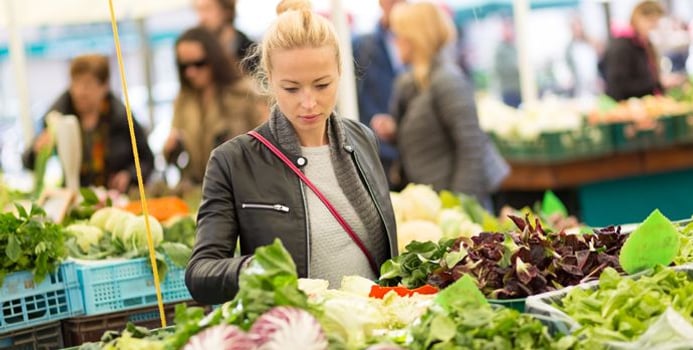If you are like the thousands of individuals trying to make more informed choices about the foods you eat, you may already be purchasing more locally-grown, organic produce, and meat, dairy or eggs. If you are frequenting local farmers’ markets, you are already taking a step in the right direction to purchase the most nutritious, environmentally-friendly ingredients while also supporting your local economy of independent farmers. Here are some tips and tricks from insiders on how to make the most of a market near you.
Pack Cash — Especially Small Bills
Break out the Washingtons and Lincolns — you’ll likely use more $1 bills and $5 bills than any other form of currency, and while some vendors do have the means to accept debit cards, not all of them do. Many simply rely on an old-school metal cash boxes. Bring coins too, especially if you plan on buying small amounts of items.
Go Early to Get Specialty Items
Get to your local farmers’ market early if you want the best selection. Products that are in high demand or are not as prolific as your everyday fruits and veggies will sell out first. If you are seeking a specific fruit, vegetable, or other market product, you will want to get there early to ensure they do not sell out — particularly if you have already planned out a recipe because popular items that farmers only have in limited quantities will sell out quickly.
For The Best Deals, Go Late
Even though you might not be able to find everything you were looking for, if you do wait until the last hour or thirty minutes that the market is open, you may be able to score some pretty sweet deals. When it’s getting close to time to close up shop, vendors are looking to get rid of their haul because they do not want to take any items back. This is because the produce may not last until the following week’s market day and they will have a whole new slew of items to pick and sell them. This means they will most likely offer whatever items they have left at a bargain price. Although much of the produce has been picked over and what is left may be slightly blemished or unsightly, you should know that “ugly” fruits and vegetables are just as nutritious and tasty as those that look perfect.
Talk to the Farmers
The growers and producers of your food are excellent resources when it comes to finding out their practices. Ask if they use any natural or chemical deterrents for insects or other critters. Ask about the use of any fertilizers, insecticides, or other chemicals, hormones, or antibiotics. Are they certified organic? Ask questions. Remember that small farmers may not have the financial resources necessary to obtain “certified organic” labeling, their practices may be completely organic and they simply can’t afford or don’t want to bother with going through the official processes to obtain that organic label.
Go Green! Don’t Forget to Grab Reusable Totes or Baskets
Although some vendors may offer plastic bags, these are damaging to the environment and are not very durable. Pack several sturdy, reusable canvas bags or small baskets. If you plan to purchase heavier items, such as potatoes or winter squash, opt for a backpack. These are better for Mother Earth and will ensure your items make it from the market to your kitchen unscathed.
Don’t Haggle Over Prices
An etiquette tip — bargaining for a better deal is not really acceptable at farmers’ markets. Farmers put in many hours of hard labor to bring you the best local fare. Farmers have to make a living too, so while you might score deals on certain items at the close of the market day, do not try to haggle over the prices as this is insulting to the farmers and makes you seem cheap.
Visit the Info Booth
The info booth at the farmers’ market will provide you with market hours as well as information on special upcoming events being held there, such as tasting events, cooking demonstrations, live music, local artist showcases, or other fun festivities you and your family can enjoy.
Ask the Farmer for Preparation Tips
The person who grew your food can do more than just sell it to you, he or she may have excellent suggestions on how to prepare it. Most of the vendors at the market take great pride in being able to show off their culinary knowledge of their foods, and many will offer you a sample to taste right there. They may also offer advice on how to store it, how to avoid spoilage, and how to use up produce when it becomes too ripe.
Try a New Fruit or Vegetable
Have you ever tried squash blossoms? What about Malabar spinach or sorrel? Be adventurous and try something new. If you are not sure what fruit or vegetable you are looking at, just ask the farmers. Not only will they be delighted to show off their unique items, they likely know the most delicious ways to prepare them.
Safety First — Bring a Cooler
While your fruits and veggies will be fine to be transported at room temperature from the market to your home, don’t forget that most farmers’ markets offer much more than just produce these days. A host of vendors may be selling eggs, meat, cheese, milk, fish, and fermented foods (such as kimchi, sauerkraut, or locally-produced kombucha tea), and these items need to be kept cold during transit. Pack a cooler with plenty of ice packs. Even if you just keep the cooler in your car while you shop, you can easily place your perishable items in the cooler once you walk back to your car. This will ensure those foods don’t end up the time-temperature danger zone.



